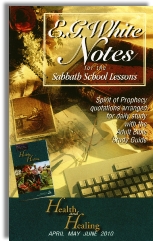|
||||||||||||||
Commentary on "Optimism: Happiness and Healing"
Day 5: Wednesday, June 9, 2010 - Laughter and Healing
Overview
This lesson tells the story of Norman Cousins who experienced a radical improvement in his dire physical condition when he learned the value of laughter and a positive attitude. We are encouraged to take control of our attitude towards life, and practice optimism. The question is asked, how can focusing on the Cross and what it reveals about God help us be more positive?
Observations
Positive thinking is the mental habit of directing one’s thoughts to be positive instead of negative. No doubt, one can feel a greater sense of well-being and health if one learns to think positively, as many secular writers like Cousins have shown.
However, Biblical joy has a different source of power than positive thinking has. When we feel happier through our own efforts, we may strengthen our physical bodies, but we may be far from Christ. Real joy is a fruit of the Spirit, and only comes through being joined to Christ (Gal. 5:23). The Galatians were also seeking extra blessings through a disciplined lifestyle, but instead of receiving blessings, they were drifting away from the Gospel and devouring each other (Gal. 4:9-11; 5:15). When we seek the blessings of the Gospel by any other means than the Gospel, we will not only miss those blessings, but we will also be turning to the “weak and worthless elementary principles of the world” (Gal. 4:9).
In Philippians 4, Paul reveals the positive thoughts that Christians are to have: things that are honorable, just, pure, lovely, commendable, and excellent (Phil. 4:8). The previous verses show us how we can have these “positive” thoughts. Notice, Paul is not talking about having superior mental discipline, but exercising the privilege of bringing everything to God in prayer and trusting Him (Phil. 4:6,7). Our mental powers are brought into captive obedience to Christ (II Cor. 10:5). In that state of mind we have a genuine reason to “think on these things.” He will guard our hearts and minds, and give us a peace that is beyond understanding.
For believers in Christ, we have much more than positive thoughts. Our glass is not just half full; it is full to overflowing. That is why we can boast in our weaknesses like Paul did, regardless of the condition of our health or circumstances. His strength is made perfect in weakness.
Conclusions
- Positive thinking is a mental discipline that may improve physical health, but our efforts will not give us His joy.
- When we seek blessings outside of the Gospel of Jesus, we are turning to the “weak and worthless elemental principles of the world.”
- The thoughts that bring peace come through admitting our weakness and trusting everything to Him in prayer.
- Because His strength is made perfect in weakness, we can always know we are blessed, whether in sickness and in health.
Copyright 2010 BibleStudiesForAdventists.com. All rights reserved. Revised June 8, 2010. This website is published by Life Assurance Ministries, Glendale, Arizona, USA, the publisher of Proclamation! Magazine. Contact email: BibleStudiesForAdventists@gmail.com.
The Sabbath School Bible Study Guide and the corresponding E.G. White Notes are published by Pacific Press Publishing Association, which is owned and operated by the Seventh-day Adventist church. The current quarter's editions are pictured above.
Official Adventist Resources
Standard Edition Study Guide Week 11
Teacher's Edition Study Guide Week 11
Easy Reading Edition Study Guide Wk 11
Search the Complete Published Ellen G. White Writings


